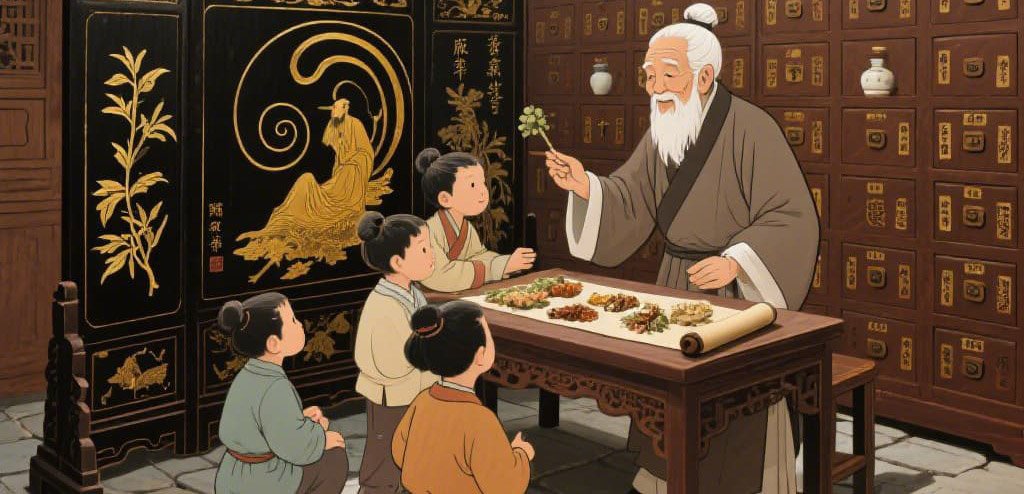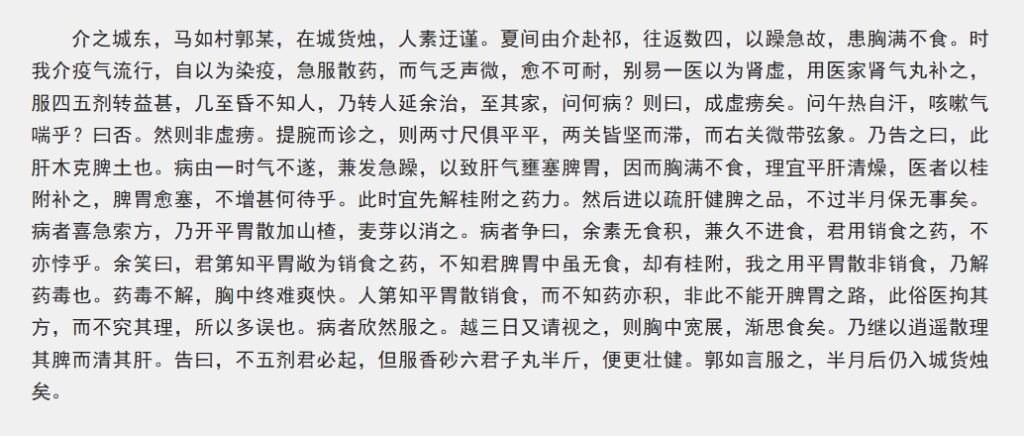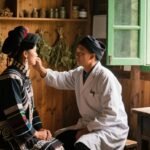In Maru Village east of Jiexiu City, there was a candle merchant named Guo. He was known for his rigid and anxious personality. During one summer, he traveled frequently between Jiexiu and Qi County. Due to his hurried schedule and irritable mood, he developed chest tightness and loss of appetite. At the time, an epidemic was spreading in Jiexiu, so Guo believed he had contracted the disease. He hastily took anti-epidemic herbal powder, but this worsened his condition, leaving him weak and breathless.
He then consulted another physician who diagnosed him with “kidney deficiency” (a Traditional Chinese Medicine [TCM] syndrome indicating insufficient kidney energy). The physician prescribed Shenqi Wan (Kidney Qi Pill, containing ingredients like Rougui [Cinnamomi Cortex, cinnamon bark] and Fuzi [Aconiti Lateralis Radix Praeparata, processed aconite root]). After taking it for four to five days, Guo’s condition deteriorated to near unconsciousness. His family then summoned me for (used in traditional contexts).
Upon arrival, I asked, “What are his main symptoms?” The family replied, “He’s extremely weak.” I followed up: “Does he experience afternoon fever, spontaneous sweating, coughing, or wheezing?” When they denied these symptoms, I concluded it was not a true deficiency syndrome (xulao).

Pulse diagnosis revealed:
- Normal pulses at the cun (distal wrist pulse) and chi (proximal wrist pulse) positions.
- Stiff and sluggish pulses at both guan positions (middle wrist pulse), with the right guan pulse showing a taut, “string-like” quality.
I explained: “This is a case of Liver Wood overacting on Spleen Earth (a TCM theory where excessive liver energy disrupts digestive function). The illness arose from emotional frustration and irritability, causing liver energy to stagnate in the stomach. The correct approach should regulate the liver and clear internal heat. However, the previous physician used hot-natured herbs like Rougui and Fuzi to tonify, which further blocked digestion and worsened the condition. We must first neutralize the lingering effects of these hot herbs before restoring liver and digestive function. Full recovery is expected within half a month.”
The patient urgently requested a prescription. I prescribed Pingwei San (Stomach-Calming Powder, containing Cangzhu [Atractylodis Rhizoma, atractylodes rhizome], Houpo [Magnoliae Officinalis Cortex, magnolia bark], etc.) with added Shanzha (Crataegi Fructus, hawthorn berry) and Maiya (Hordei Fructus Germinatus, barley sprout). Guo protested: “I haven’t eaten much lately and have no food stagnation. Why use digestive herbs?”
I clarified: “You know Pingwei San aids digestion, but your stomach isn’t clogged with food—it’s blocked by residual heat from the previous herbs. This formula isn’t for food stagnation but to clear medicinal toxicity. Until these residues are removed, your chest discomfort will persist. Conventional physicians rigidly follow textbook uses without understanding this flexibility—that’s why mistakes occur.”
Guo took the formula willingly. Three days later, his chest tightness eased, and his appetite returned. I then switched to Xiaoyao San (Free and Easy Wanderer Powder, containing Chaihu [Bupleuri Radix, bupleurum root], Baishao [Paeoniae Radix Alba, white peony root], etc.) to regulate digestion and soothe liver stress. I advised: “Five more doses will restore your health. Follow with Xiangsha Liujunzi Wan (Six Gentlemen Pill with Muxiang [Aucklandiae Radix, aucklandia] and Sharen [Amomi Fructus, amomum fruit])—take half a jin (≈250g) to strengthen your constitution.”
Guo followed the regimen and fully recovered within two weeks, resuming his candle business in the city.

Glossary of Formulas:
- Pingwei San: A foundational formula for resolving dampness or medicinal stagnation in the stomach.
- Xiaoyao San: Classic formula for harmonizing liver-spleen function and relieving emotional stress.
- Xiangsha Liujunzi Wan: Mild tonic formula combining Renshen (Ginseng Radix, ginseng), Baizhu (Atractylodis Macrocephalae Rhizoma, white atractylodes rhizome), etc.


Leave a Reply